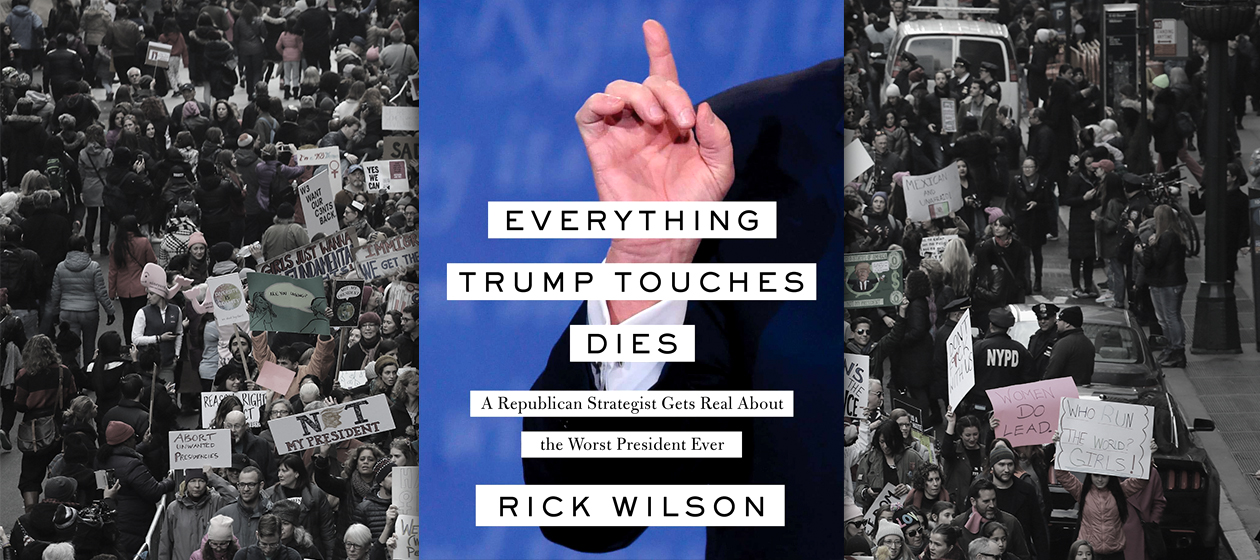Trump haters will love Rick Wilson's scathing new book, Everything Trump Touches Dies
The GOP strategist has harsh words for Trump, his base, and his enablers in Washington


A free daily email with the biggest news stories of the day – and the best features from TheWeek.com
You are now subscribed
Your newsletter sign-up was successful
To Americans who didn't vote for President Trump, life in Trumplandia can often feel like being a survivor in a zombie flick. It's as if we're hiding in a boarded-up house, clinging to one another, as the malevolently somnambulant hordes of MAGAs grumble and lurch toward us, bringing with them certain death and destruction. If, like me, you relate to this feeling, think of Rick Wilson as the bad-ass hombre who shows up in the middle of the second act, ready to teach us how to fight back.
Wilson is a national Republican political strategist and media consultant who has worked for gubernatorial and senatorial campaigns, super PACs, and corporations. In his new, deliciously vicious book, Everything Trump Touches Dies: A Republican Strategist Gets Real About the Worst President Ever (ETTD), Wilson critiques Trump and his enablers from the right. His raw-brawling style and deftly articulated rage at "a certain frequent tweeter with an exotic dead-animal hairstyle and a notoriously short temper" have made Wilson an unexpected darling of the left, and a kind of Cassandra in steel-toed boots for his own party.
Though Wilson describes himself in ETTD as having been "a gleeful hatchet man for the GOP" in the past, this book artfully eviscerates the Republicans, donors, lobbyists, and consultant class that allowed Trump to rise. Wilson steeps the book in a trenchant analysis of how Trumpism functions as a Cheeto-smeared mirror inverse of traditional conservative values, specifically fiscal responsibility and limited government. He serves that analysis with some scalding-hot tea about the "Vichy Republicans" who keep offering Trump and his associates (arguably quite literal) "Get Out of Jail Free" cards: "A [Paul] Ryan aide told me that he had allowed [Devin] Nunes to run buck wild to keep the small but vocal Trumphadi caucus in line," he writes. The book is a clarion call to conservatives about how "Kim Jong Don's" reverse-Midas touch is "an Orwellian erasure of what conservatism represents" that will define the party for generations to come.
The Week
Escape your echo chamber. Get the facts behind the news, plus analysis from multiple perspectives.

Sign up for The Week's Free Newsletters
From our morning news briefing to a weekly Good News Newsletter, get the best of The Week delivered directly to your inbox.
From our morning news briefing to a weekly Good News Newsletter, get the best of The Week delivered directly to your inbox.
When I spoke to Wilson, he lamented the "ideological monoculture" on the right (and, to be fair, on the left as well): "As a member of Congress or a member of the Senate, you are a representative of the people who sit you there." Now that Republican elected officials live in what he calls "Fear of a Mean Tweet," he says, "that representative work gets lost."
But Wilson saves his most cathartic, hurts-so-good takedown for the Trump base, which he calls "three million zombies." This chapter is a vital antidote to the umpteen million think pieces that break their own arms patting themselves on the back for portraying the Trumpie as some plain-talkin', diner-lovin', be-callused sage of the Real America. The Trump supporters I know include an unemployed neighbor with multiple chronic conditions who hates "ObummerCare" but would be dead without the Affordable Care Act; a woman I once worked with who despises "how everyone has to be all political these days" but can't stop bashing "the liberals" for protesting against putting children in cages; and even my own father, who will believe that Hillary Clinton ran a sex ring out of a D.C. pizzeria, but not that Russia attacked our election. Wilson accurately captures this odd amalgamation of voters in ETTD.
"Trump's notorious base is impervious to reason and immune to irony," he writes. "They are willful, petulant, and full of pointless defiance … They don't get to bitch about triggered, liberal snowflake social justice warriors while nursing a set of grievances that lead them to spittle-flecked outrage at the slightest challenge to their worldview."
Wilson also takes the media to task for conducting "softly-lit interviews with 'Ma and Pa Soybean' farmer" and expresses skepticism at what this "coal-country Kristof"-style of reporting accomplishes: "It's a disgusting sort of contemptuous paternalism, and it's a shtick, it's not analysis," he tells me. "It's not a real penetration into what is actually going on in the lives and minds of these people. When you scratch that surface more than a couple of millimeters, you find that is there is a lot of racial animosity."
A free daily email with the biggest news stories of the day – and the best features from TheWeek.com
He wants the media to start pushing back on the "TV character" vision of Trump, the "'he's a businessman and he wrote The Art of the Deal so even though … we are going to lose our house and our farm, we love him because he knows what he's doing'" phantom president: "The responsibility of the reporters is to say, 'You know he's not going to do that. You know you are talking about a TV character, not a real person,'" Wilson says.
The negative repercussions of Trump's presidency have been massive, and they stretch far and wide. Ironically, Trump himself hasn't been spared. If he hadn't run for office, most of the country would still regard him as a TV character; now, as "the Nickelback of presidents" (one of Wilson's best takedowns in a book chock full of 'em) his criminality and incompetence are in a bleached-bright spotlight of scrutiny — at least to those of us who haven't contracted the MAGA virus. Trump's buffoonery lends itself to easy parody, but Wilson's acid-burns of wittiness don't obscure the deeper and more tragic wounds of Trump's presidency. "We need to relearn lessons that get forgotten about authoritarianism and nationalism," he tells me. "We need to rededicate ourselves as a country … if [we're] not a propositional nation where anybody can become an American — we are not a country anymore; we are not America anymore."
As one of the few Republicans who has refused to bend the knee to Trump, Wilson has taken a harder road (where there's a troll who still can't differentiate between your and you're under every bridge): His family and his business have been threatened more than once, and his Twitter feed is constantly under attack. Still, he believes strongly that he's in the right. He likens the Never Trump movement to Dunkirk, where against the odds, seemingly small and intimate acts of valor helped to cement the Allies' eventual victory: "So many people had to do the right thing, the bold thing, the brave thing, the hard thing," he tells me. "You had guys getting in little sailboats that maybe they could take four or five people off the shore … If you didn't have Dunkirk, you couldn't save the British army and you couldn't defeat Hitler two years later." Wilson is trying to save the soul of his country, and of the American right, by launching his own small (and not-so-small) sailboats of awareness and insight every day.
Laura Bogart is a featured writer for Salon and a regular contributor to DAME magazine. Her work has appeared in The Atlantic, CityLab, The Guardian, SPIN, Complex, IndieWire, GOOD, and Refinery29, among other publications. Her first novel, Don't You Know That I Love You?, is forthcoming from Dzanc.
